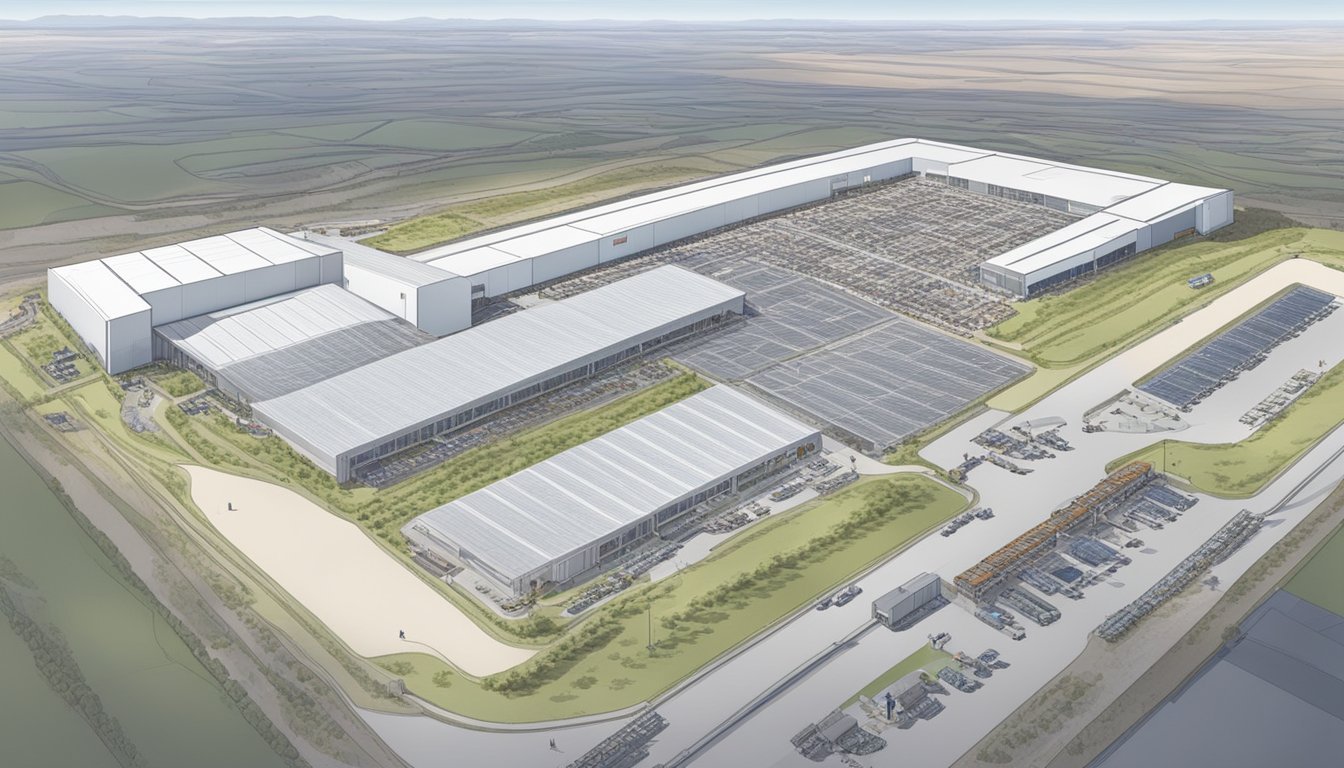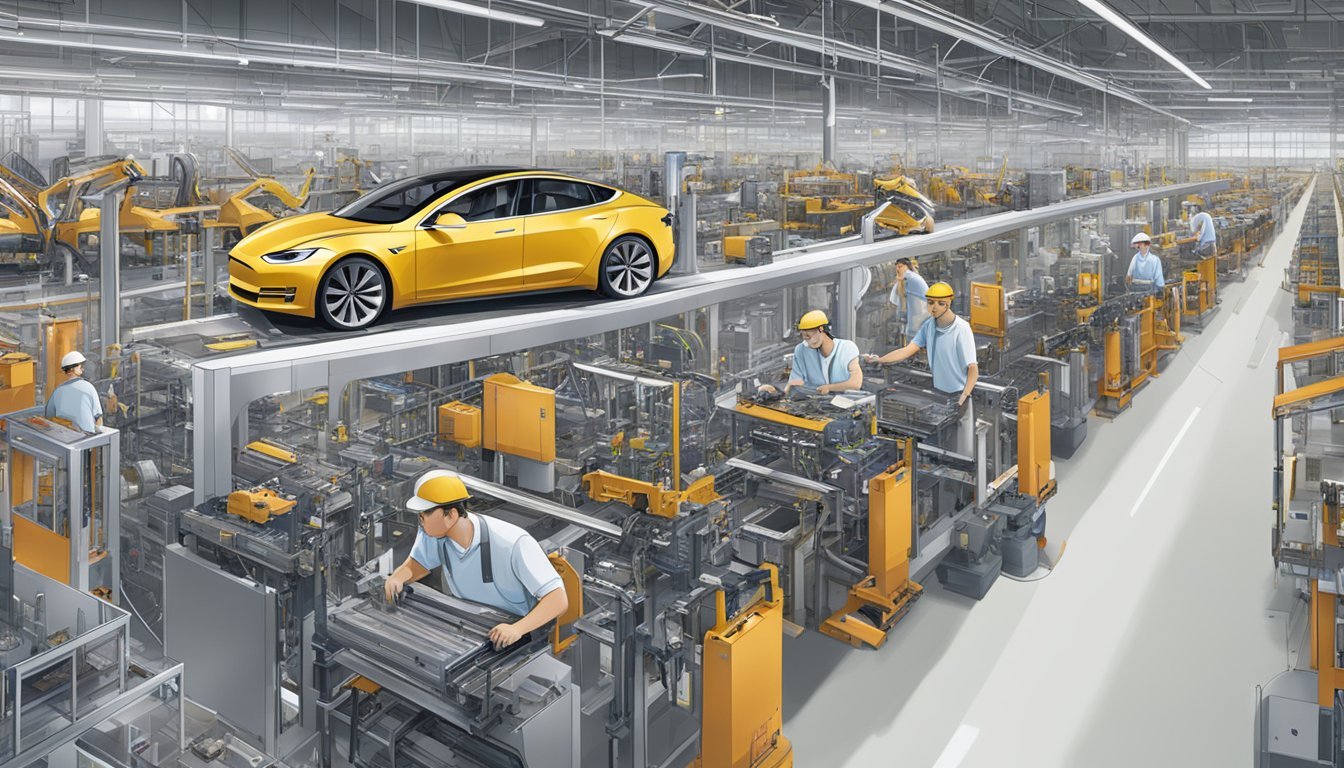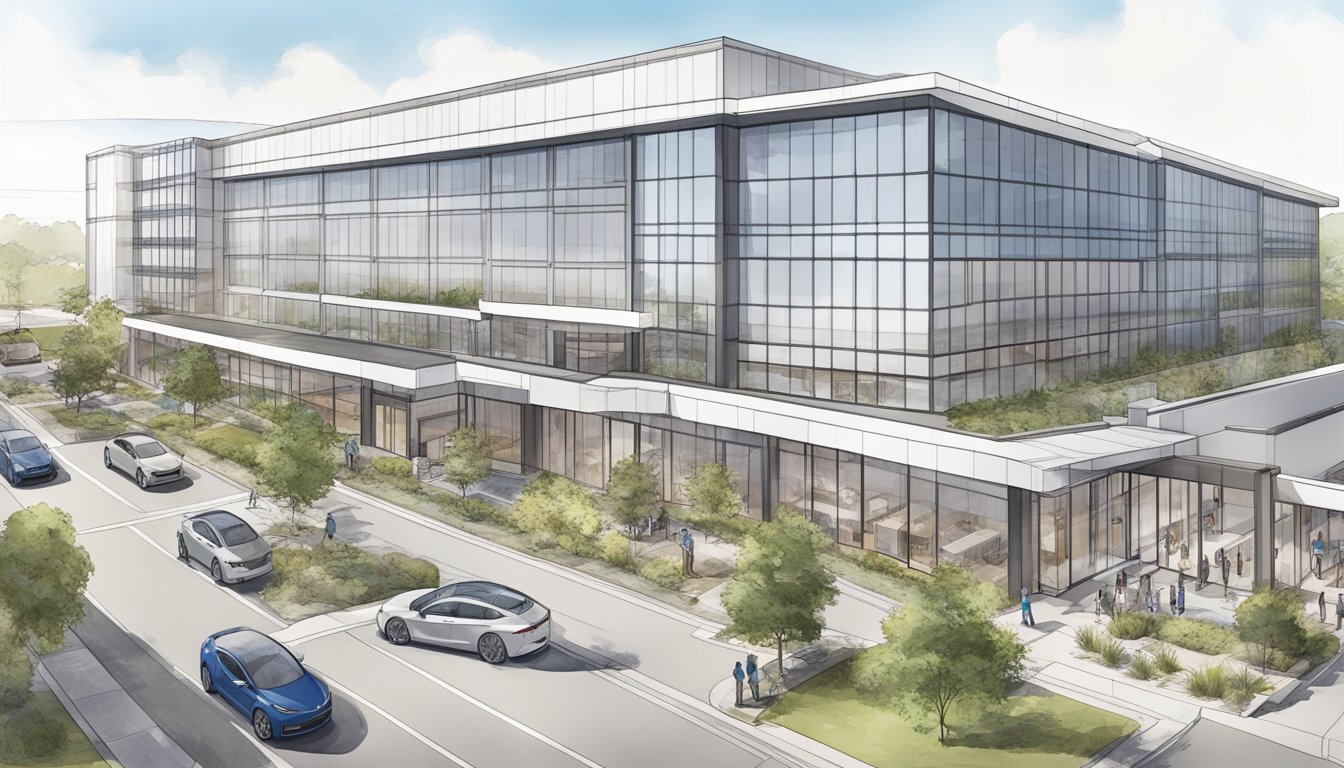Tesla Austin Employee Count Skyrockets: Largest Private Employer in the City!
Tesla's rapid growth in Austin has reshaped the city's employment landscape. The electric vehicle manufacturer has expanded its workforce significantly since establishing Gigafactory Texas.
Tesla now employs 22,777 people in Austin, making it the largest private employer in the Texas capital. This marks a substantial increase from the 12,277 employees reported just a year earlier. The company's workforce expansion has outpaced other major employers in the area, including H-E-B, which previously held the top spot with approximately 19,000 employees.
Gigafactory Texas has played a crucial role in Tesla's local employment surge. The facility has become a major hub for the company's operations, contributing to its overall growth. Tesla's total global workforce reached 127,855 full-time employees by the end of the previous year, reflecting the company's continued expansion despite challenges faced by other tech companies.
History and Background of Tesla in Austin
Tesla's expansion into Austin marks a significant chapter in the company's growth and Austin's economic development. The electric vehicle manufacturer's presence has rapidly transformed the region's industrial landscape.
Establishment of Gigafactory Texas
Tesla announced its plans for Gigafactory Texas in July 2020. The company selected a 2,100-acre site in southeastern Travis County, just outside Austin city limits. Construction began swiftly, with the factory becoming operational in less than two years. The facility's primary focus is the production of the Cybertruck, Model Y, and energy storage products.
Tesla's speed in building and launching the factory was remarkable. The company utilized innovative construction techniques and leveraged local resources to accelerate the process. By April 2022, Gigafactory Texas held its grand opening, dubbed "Cyber Rodeo," showcasing the facility's capabilities to the public.
Tesla's Expansion to Central Texas
Tesla's move to Central Texas extended beyond manufacturing. In December 2020, CEO Elon Musk announced the relocation of Tesla's headquarters from California to Texas. This decision brought additional corporate functions and employees to the Austin area.
The company's presence grew rapidly. Tesla established offices in downtown Austin and expanded its footprint across the region. The influx of Tesla employees and operations sparked growth in related industries, including suppliers and tech companies seeking proximity to the automotive innovator.
Impact on Austin's Economy
Tesla's arrival significantly boosted Austin's economy. The Gigafactory alone created thousands of jobs, with employment numbers reaching 22,777 by 2023. This rapid growth made Tesla Austin's largest private employer, surpassing long-established local companies.
The economic impact extended beyond direct employment. Tesla's presence attracted suppliers, stimulated the housing market, and increased demand for local services. The company's high-profile move also enhanced Austin's reputation as a tech hub, drawing more businesses and talent to the area.
Tesla's investment in workforce development and partnerships with local educational institutions further strengthened its economic influence. These initiatives helped create a skilled labor pool for the growing electric vehicle and renewable energy sectors in Central Texas.
Tesla's Workforce in Austin
Tesla has rapidly expanded its presence in Austin, becoming the city's largest private employer. The company's workforce growth reflects its ambitious plans for the Gigafactory Texas facility and its commitment to the local economy.
Current Headcount and Goals
Tesla's Austin workforce reached 22,777 employees by the end of 2023, marking an 86% increase from the previous year. This substantial growth occurred at the Gigafactory Texas, which has become a crucial hub for Tesla's operations.
The company's hiring surge aligns with its production goals and expansion plans. Tesla aims to continue ramping up manufacturing capacity at the Austin facility.
Average hourly wages for Tesla's Austin employees stand at $35.75, with new hires starting at $30.14 per hour. These competitive wages contribute to the company's ability to attract and retain talent in the area.
Comparison with Other Local Employers
Tesla's workforce of 22,777 has propelled it past H-E-B, the grocery store chain, as Austin's largest private employer. This achievement underscores Tesla's significant economic impact on the region.
The company's rapid growth contrasts with more established local employers. Tesla's employee count now surpasses many long-standing Austin businesses and institutions.
Tesla's presence has reshaped the local job market, creating opportunities in manufacturing, engineering, and technology sectors. The company's expansion has attracted skilled workers to the area, contributing to Austin's reputation as a growing tech hub.
Manufacturing Capabilities
Tesla's Gigafactory Texas boasts impressive production capabilities. The facility focuses on manufacturing the Model Y and Cybertruck while also producing battery cells.
Production Capacity of Gigafactory Texas
Gigafactory Texas has rapidly scaled up its manufacturing capacity since opening. The factory currently produces hundreds of thousands of vehicles annually. Tesla designed the facility for high-volume production, with advanced automation and efficient assembly lines.
The plant's layout optimizes workflow and minimizes production bottlenecks. Tesla implemented lessons learned from its other factories to maximize output at Gigafactory Texas. The company continues to refine processes and increase automation to boost productivity.
Battery cell production is another key focus at the Austin facility. In-house battery manufacturing helps Tesla control costs and secure its supply chain.
Model Y and Cybertruck Production
Model Y production forms a significant portion of Gigafactory Texas's output. Tesla streamlined the Model Y manufacturing process, incorporating innovative techniques like large casting machines for the vehicle frame.
The Cybertruck represents a new challenge for Tesla's manufacturing team. Its unique stainless steel body and angular design require specialized production methods. Tesla developed new manufacturing processes specifically for Cybertruck assembly.
Both vehicles benefit from the factory's advanced paint shop and final assembly lines. Tesla's vertically integrated approach allows for tight quality control throughout production.
Economic Incentives and Compliance
Tesla's Austin Gigafactory operates under an economic incentive agreement with Travis County. This arrangement includes specific employment targets and reporting requirements to ensure compliance and economic benefits for the local community.
Economic Development Program Participation
Tesla participates in Travis County's Economic Development Program. This program offers tax incentives in exchange for job creation and local economic investment. The agreement stipulates that Tesla must create at least 5,000 jobs at its Austin facility. Additionally, at least 50% of these positions must be filled by Travis County residents.
The incentive package aims to stimulate economic growth in the region. It encourages Tesla to prioritize local hiring and contribute significantly to the area's employment landscape.
Annual Compliance Reporting
Tesla submits an Annual Compliance Report to Travis County as part of its agreement. This report, due by March 31 each year, details the company's performance in meeting its economic development commitments.
The 2023 report revealed impressive growth. Tesla reported 22,777 employees in the Greater Austin Area, surpassing initial projections. This represents an 86% increase from the previous year's 12,277 employees. The report also confirmed that Tesla met the requirement of hiring at least 50% Travis County residents.
The average hourly wage for Tesla's Austin-area employees stands at $35.75. This data demonstrates Tesla's substantial impact on local employment and wage standards.
Community and Environmental Impact
Tesla's Gigafactory in Austin has sparked significant changes in the local area. The facility has brought economic growth but also raised environmental concerns.
Local Infrastructure and Development
Tesla's presence has driven substantial economic activity in Austin. The company's investment has created approximately 15,000 jobs at the Gigafactory. Tesla employees in Travis County earned an average annual salary of $66,000 in 2022, while the company-wide average is $74,000.
The influx of workers has spurred development in surrounding areas. New housing, retail, and service businesses have emerged to support the growing population. Local roads and utilities have been upgraded to handle increased demand.
Rooftop Solar Installation and Clean Energy Initiatives
Tesla has implemented rooftop solar panels at its Gigafactory, aligning with the company's clean energy mission. This installation helps offset some of the facility's power consumption and reduces its carbon footprint.
However, environmental concerns have surfaced. Reports indicate Tesla may have released pollutants into nearby water sources, including the Colorado River. The Texas Commission on Environmental Quality has conducted multiple investigations into potential environmental violations at the site.
These issues highlight the complex balance between industrial development and environmental stewardship in rapidly growing areas.
Future Prospects and Expansion Plans
Tesla's Austin facility is poised for significant growth in the coming years. The company has ambitious plans to increase its workforce and expand its manufacturing capabilities in the Texas capital.
Planned Growth and Future Projects
Tesla aims to triple its Austin workforce to 60,000 employees once Cybertruck production is fully underway. This massive increase will solidify the company's position as the largest private employer in the region. Tesla is also planning a substantial expansion of its Gigafactory Texas, with documents revealing an additional 5 million square feet of space.
The expansion is already in progress and will likely accommodate new production lines and increased manufacturing capacity. This growth aligns with Tesla's strategy to ramp up Cybertruck production and potentially introduce new vehicle models or expand battery production.
Potential Impact on Job Growth and the Region
Tesla's expansion plans are expected to have a significant impact on job growth in Austin and the surrounding areas. The addition of nearly 40,000 new jobs will create opportunities across various skill levels and disciplines.
This influx of employment is likely to attract more talent to the region, potentially spurring further economic development. As Tesla cements its role as a major manufacturing hub, it may also attract suppliers and related industries to the area.
The growth of Tesla's Austin facility could lead to:
Increased demand for housing and infrastructure
Expansion of local businesses to support the growing workforce
Enhanced educational and training programs to meet Tesla's hiring needs
Strengthened positioning of Austin as a tech and manufacturing center
These developments may contribute to Austin's reputation as a fast-growing region and reinforce its status as an attractive destination for both businesses and workers in the technology and manufacturing sectors.
Additional Ventures and Collaborations
Tesla's presence in Austin extends beyond vehicle manufacturing, encompassing new projects and partnerships that further solidify its economic impact in the region.
Tesla's Lithium Refinery Project
Tesla is constructing a lithium refinery near Corpus Christi, Texas. This facility aims to process battery-grade lithium hydroxide for use in electric vehicle batteries. The project represents a significant investment in the state's growing clean energy sector. Tesla expects the refinery to produce enough lithium to support the production of approximately 1 million electric vehicles annually. The facility will create new jobs and strengthen Tesla's supply chain for critical battery materials.
Strategic Partnerships in the Area
Tesla has forged strategic partnerships with local businesses and educational institutions in the Austin area. These collaborations focus on workforce development, research, and innovation in electric vehicle technology. The company works with community colleges to develop training programs that prepare students for careers in advanced manufacturing. Tesla also partners with the University of Texas at Austin on research projects related to battery technology and autonomous driving systems. These partnerships help foster a skilled local workforce and drive technological advancements in the electric vehicle industry.









